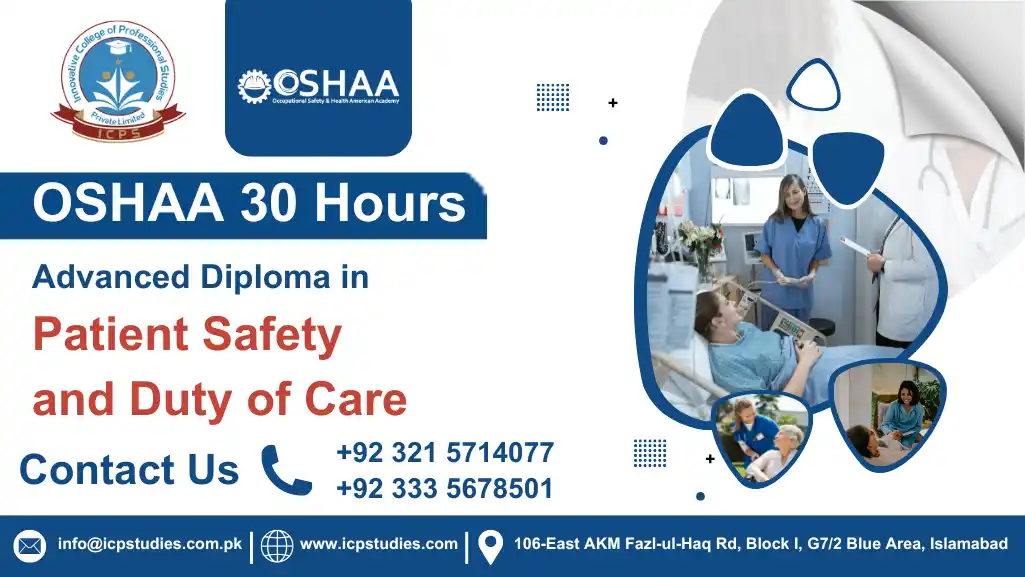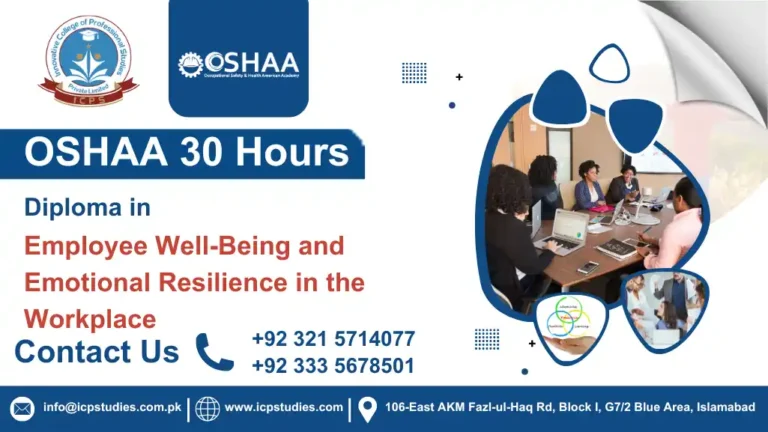The OSHAA 30-Hours Advanced Diploma in Patient Safety and Duty of Care is an in-depth training programme designed for healthcare professionals, including nurses, clinicians, hospital administrators, and care workers. The diploma spans 30 hours of focused instruction, combining theoretical insights with practical applications. This OSHAA 30-Hours Advanced Diploma in Patient Safety and Duty of Care provides an integrated framework for understanding how duty of care aligns with regulatory compliance and ethical responsibilities in clinical settings. Participants learn how to identify risks, implement safety strategies, and foster a culture of accountability within healthcare environments.
The OSHAA 30-Hours Advanced Diploma in Patient Safety and Duty of Care equips professionals with the tools and mindset to meet these responsibilities effectively. By enrolling in this diploma, healthcare workers position themselves as leaders in clinical safety, contributing to a more resilient and patient-centred care system. For those looking to advance their career and improve the quality of care they provide, this OSHAA 30-Hours Advanced Diploma in Patient Safety and Duty of Care represents a significant and timely step forward. In today’s ever-evolving healthcare landscape, the importance of patient safety and the duty of care has never been greater.
The OSHAA 30-Hours Advanced Diploma in Patient Safety and Duty of Care is a comprehensive, flexible, and accessible course designed for healthcare professionals seeking to improve patient care standards and their own professional development. This course equips you with the skills necessary to navigate the complexities of modern healthcare, where patient safety is at the forefront of quality care. Patient safety and the duty of care are essential elements in providing the highest standard of healthcare. By enrolling in the OSHAA 30-Hours Advanced Diploma in Patient Safety and Duty of Care, you’ll be taking a vital step towards improving your skills, safeguarding patients, and contributing to a culture of safety and quality in healthcare settings.
All About OSHAA 30-Hours Advanced Diploma in Patient Safety and Duty of Care
Course Overview
The OSHAA 30-Hours Advanced Diploma in Patient Safety and Duty of Care is a professionally structured course aimed at enhancing the competencies of healthcare professionals in delivering safe, ethical, and accountable care. The OSHAA 30-Hours Advanced Diploma in Patient Safety and Duty of Care focuses on building a deep understanding of patient safety principles, duty of care obligations, and the practical application of these concepts in daily clinical environments.
Participants will explore key topics including risk assessment, incident reporting, infection control, ethical decision-making, and communication in healthcare settings. The OSHAA 30-Hours Advanced Diploma in Patient Safety and Duty of Care content is aligned with current healthcare regulations and supports professionals in meeting national standards such as those set by the NHS and Care Quality Commission.
This OSHAA 30-Hours Advanced Diploma in Patient Safety and Duty of Care is ideal for healthcare workers including nurses, care assistants, medical officers, and practice managers who are committed to improving patient outcomes and promoting a culture of safety. Through a combination of theory and case-based learning, professionals will gain confidence in identifying hazards, preventing harm, and responding effectively to patient safety concerns.
Upon successful completion, learners receive a globally recognised OSHAA certification, enhancing their professional credibility and career prospects. The OSHAA 30-Hours Advanced Diploma in Patient Safety and Duty of Care supports continuous professional development and contributes to safer, more efficient, and patient-centred healthcare delivery.
Study Units
- Introduction to Patient Safety and Duty of Care
- Legal and Ethical Responsibilities in Healthcare
- Risk Assessment and Management in Patient Safety
- Preventing and Responding to Medical Errors
- Communication Skills for Patient Safety
- Safeguarding Vulnerable Patients
- Managing and Mitigating Risks in Healthcare Settings
- Creating a Culture of Safety in Healthcare Organizations
To ensure that participants are able to fully engage with the course content and apply the learning effectively in healthcare settings, applicants must meet the following entry requirements:
Minimum Age
Applicants must be at least 18 years of age at the time of enrolment.
Educational Background
A minimum of a secondary school education (GCSEs or equivalent) is required. Preference may be given to applicants who hold a diploma or degree in healthcare, nursing, or a related field.
Work Experience
While not mandatory, prior experience in a healthcare or care-related setting is highly recommended. This course is particularly beneficial for current healthcare professionals, care workers, or those in supervisory roles.
Language Proficiency
As the course is delivered in English, applicants must have a good command of written and spoken English. Non-native English speakers may be required to demonstrate language proficiency through recognised qualifications such as IELTS (minimum score of 5.5) or equivalent.
This course is designed for individuals across the healthcare and social care sectors who are committed to enhancing patient safety and upholding professional standards of duty of care. Intended learners include:
- Registered Nurses and Midwives – seeking to expand their understanding of patient safety protocols and regulatory responsibilities.
- Healthcare Assistants and Support Workers – aiming to improve day-to-day care delivery and safety awareness.
- Allied Health Professionals – including physiotherapists, paramedics, and occupational therapists involved in patient care.
- Clinical Supervisors and Team Leaders – responsible for overseeing staff, ensuring compliance, and managing care quality.
- Care Home and Community Care Staff – looking to ensure safer practices in residential and domiciliary care settings.
- Healthcare Managers and Compliance Officers – involved in quality assurance, risk assessment, and meeting legal obligations.
- Aspiring Healthcare Professionals – individuals with relevant experience or qualifications looking to enter or progress within the healthcare field.
This diploma is ideal for professionals committed to continuous development and seeking a formal qualification to enhance their competence in delivering safe, ethical, and accountable care.
Learning Outcomes
Introduction to Patient Safety and Duty of Care
- Understand the fundamental principles of patient safety and duty of care in healthcare
- Recognise the impact of unsafe practices on patient outcomes and organisational performance
- Identify the roles and responsibilities of healthcare professionals in promoting safety
- Develop awareness of global standards and guidelines in patient safety
Legal and Ethical Responsibilities in Healthcare
- Demonstrate understanding of key legal and ethical frameworks relevant to healthcare practice
- Identify the consequences of breaching legal duties or ethical obligations in patient care
- Apply principles of informed consent, confidentiality, and professional accountability
- Distinguish between legal compliance and ethical decision-making in complex situations
Risk Assessment and Management in Patient Safety
- Understand the process of identifying, analysing, and prioritising risks in healthcare settings
- Apply risk assessment tools and techniques to prevent potential harm
- Develop action plans for risk control and mitigation
- Monitor and evaluate risk management strategies for continuous improvement
Preventing and Responding to Medical Errors
- Identify common causes and types of medical errors in healthcare environments
- Understand the importance of transparency, reporting, and learning from errors
- Apply best practices for preventing avoidable harm through system-based approaches
- Respond effectively to incidents using root cause analysis and structured reporting
Communication Skills for Patient Safety
- Enhance communication techniques to support safe and effective patient care
- Understand the role of clear, timely, and accurate communication in error prevention
- Apply structured communication tools such as SBAR (Situation-Background-Assessment-Recommendation)
- Promote a culture of openness, collaboration, and shared responsibility
Safeguarding Vulnerable Patients
- Recognise signs of abuse, neglect, or exploitation in vulnerable patient groups
- Understand safeguarding responsibilities and legal reporting requirements
- Respond appropriately to safeguarding concerns within professional boundaries
- Promote dignity, respect, and protection of vulnerable individuals in all care interactions
Managing and Mitigating Risks in Healthcare Settings
- Identify environmental, organisational, and procedural risks affecting patient safety
- Implement control measures to reduce risk exposure across healthcare services
- Evaluate the effectiveness of existing policies and procedures in mitigating risk
- Contribute to continuous improvement through proactive safety planning
Creating a Culture of Safety in Healthcare Organizations
- Understand the elements that contribute to a positive safety culture
- Promote leadership engagement, team collaboration, and staff empowerment
- Encourage incident reporting, learning from errors, and non-punitive responses
- Support organisational commitment to transparency, accountability, and patient-centred care
FAQs OSHAA 30-Hours Advanced Diploma in Patient Safety and Duty of Care







